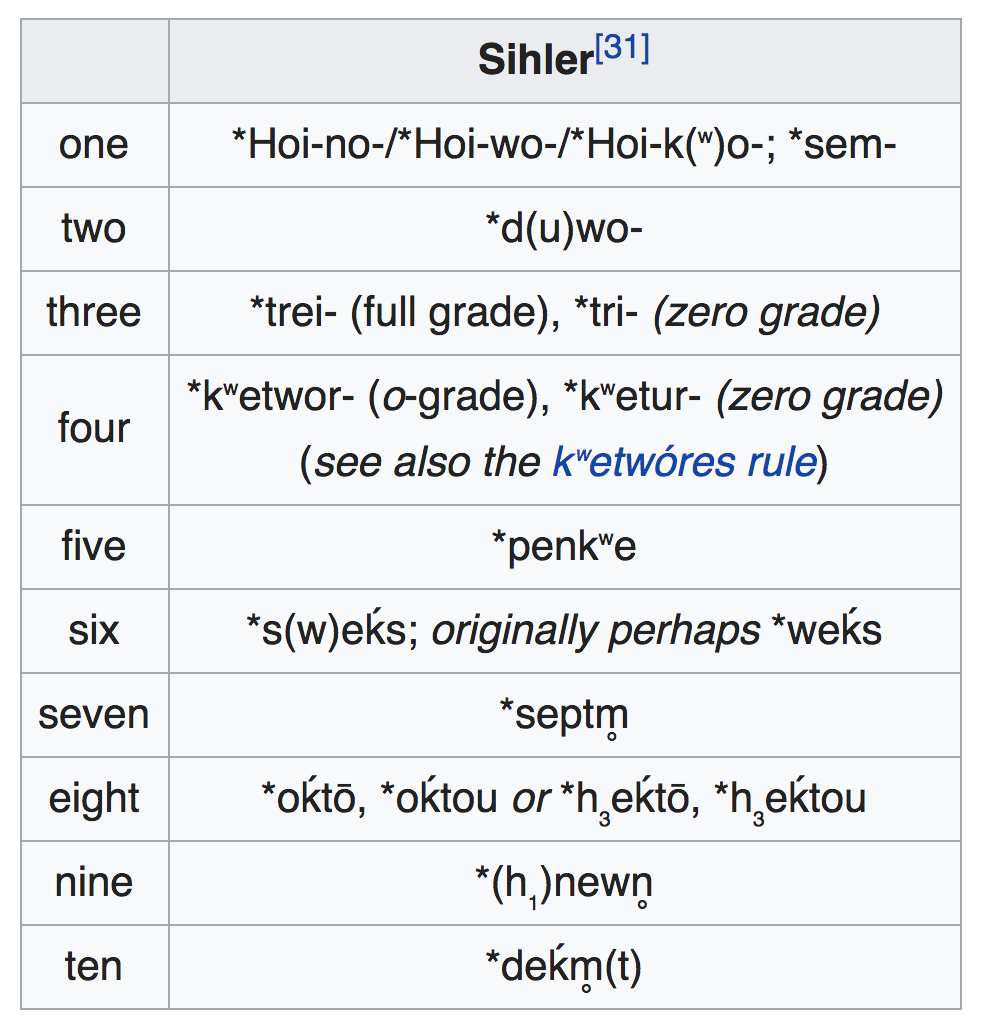To simplify is to lie. And yet, understanding a lie is better than misunderstanding the truth. Simplifying it, we’ll say that several thousand years ago, a people living in what we now call Ukraine spoke a beautiful and complex language. The people domesticated horses, rode wheel wagons, traveled and migrated, thereby spreading its culture and language. But in the spreading, the language became transformed into a hundred other languages, as varied as Sanskrit and Greek, Latin and Russian, Portuguese and German. The original language itself disappeared, and all we have left are the transformations.
We can’t prove this, but we can argue for it using indirect evidence, mostly by comparing different languages, and also by using some genetics and some archaeology.
For instance, the words for numbers one to ten are very similar in disparate languages. Is this a crazy, crazy coincidence, or do the disparate languages come from a shared root?
This hypothetical language for which we don’t have hard evidence is called Proto-Indo-European—that is, a language that was the “prototype” for many languages spoken in Europe and in India. Some of these languages are now dead, and others are alive and well, thank you very much . . . like, you know, English, for chrissakes.
Misleading as it may seem, this post isn’t about the Proto-Indo-European hypothesis. It’s about the things we believe in, and the reasons why we believe them.
“Do you believe in a Supreme Being?” It’s perhaps more constructive to ask the question like this: “What suits you better, to believe in a Supreme Being or not to believe in a Supreme Being?” What suits you better, to believe in a hopeful future or to believe in doom? What suits you better, to believe that animals have self-awareness or that they're a bundle of reflexes? What suits you better, to believe that mathematics is exciting or boring? If you adamantly affirm that mathematics is boring, you’re saying that at least for now it suits you better to believe that mathematics is boring. You're making a statement about yourself, not the thing or person or idea in question. And this is inevitable: any one thing is what you make of it, and the "you" in it is primary, the "thing" is secondary.
It suits me to believe in the Proto-Indo-European hypothesis. It stimulates my imagination, it leads me to seek connections among words and among languages, it invites me to study history and geography and linguistics. In my head trip (my subjective response, informed by my subjective filters), this ancestral language was deeply rooted in nature and full of symbolic dimensions born of the mysteries of existence. No, I can’t prove any of it; no, I don’t know what I'm talking about; yes, I like believing in it because it gives me—here, now!—a feeling of rootedness and integration.
Suppose the Proto-Indo-European hypothesis will be debunked one of these days: a geologist or a psychiatrist or an albino raccoon from outer space will demonstrate that the hypothesis is a fabrication, a delusion, a HOAX! It’s not going to change anything for me. I’ll carry on believing in it, because I like it; it’s meaningful to me, it’s beautiful, just beautiful.
As you can see, the speculative and hypothetical Proto-Indo-European (PIE) root for the word "beauty" is related to the idea of reverence. It proves!—beyond a shade of doubt!—how poetic and integrative our ancestral language was! (It proves no such thing, of course; I'm having a head trip and enjoying myself, and teasing myself about how silly I am at the same time that I state an actual belief of mine. Exclamation marks are obligatory when you're incoherent and drunk-happy.)
Your beliefs may be completely different from mine, but you and I are alike in that we believe what suits us, temperamentally and culturally. From hard facts, from soft facts, from un-facts and anti-facts we build our personal narratives through filters of which we aren't always aware. Let's respect the facts, acknowledge the filters, and assume full ownership of our beliefs.
©2018, Pedro de Alcantara




